Stephen D. Morrison's Blog, page 20
April 18, 2014
One Died For All; All Died (11 Translations of 2 Corinthians 5)
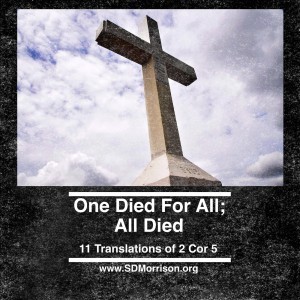 Happy Easter! One of the most revelatory verses for my personal life with God over the last year or two has been 2nd Corinthians 5 (specifically verses 13-19). To celebrate Good Friday, and the wonderful meaning of Jesus’ death, I have compiled a few (11) of my favorite translations of 2 Corinthians 5. Some of them are wordy, some clever, some profound. But overall, I hope these translation treasures will breath new life into the Gospel for you!
Happy Easter! One of the most revelatory verses for my personal life with God over the last year or two has been 2nd Corinthians 5 (specifically verses 13-19). To celebrate Good Friday, and the wonderful meaning of Jesus’ death, I have compiled a few (11) of my favorite translations of 2 Corinthians 5. Some of them are wordy, some clever, some profound. But overall, I hope these translation treasures will breath new life into the Gospel for you!
(All italics: emphasis mine.)
Kenneth Wuest New Testament
13-14 For, whether we were out of our mind, it was with respect to God; whether we are of sober mind, it is with respect to you. For the Love which Christ has for me presses on me from all sides, holding me to one end, and prohibiting me from consider any other, wrapping itself around me in tenderness, giving me an impelling motive, having brought me to this conclusion, namely, that One died on behalf of all, therefore, all died.
17 So that, assuming that anyone is in Christ, he is a creation new in quality. The antiquated, out-of-date things [which do not belong to the new life in Christ] have passed away. Behold, all things have become new in quality.
J.B. Phillips
13-14 If we are “mad” it is for God’s glory; if we are perfectly sane it is for your benefit. The very spring of our actions is the love of Christ. We look at it like this: if one died for all men, then, in a sense, they all died.
17-19 For if a man is in Christ he becomes a new person altogether—the past is finished and gone, everything has become fresh and new. All this is God’s doing, for He has reconciled us to Himself through Christ; and He has made us agents of the reconciliation. God was in Christ personally reconciling the world to Himself—not counting their sins against them…
New English Bible
13-14 It may be that we are beside ourselves, but it is for God; if we are in our right mind, it is for you. For the love of Christ leaves us no choice: when once we have reached the conclusion that one man died for all and therefore all mankind has died.
17 When anyone is united to Christ, there is a new world; the old order has gone, and a new order has already begun.
Today’s English Version
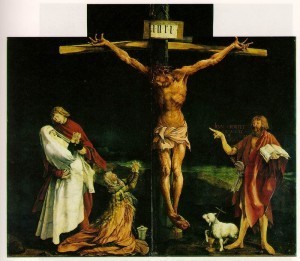 13-14 Are we really insane? It is for God’s sake. Or are we sane? It is for your sake. We are ruled by Christ’s love for us, now that we recognize that one man died for all men, which means that all men take part in His death.
13-14 Are we really insane? It is for God’s sake. Or are we sane? It is for your sake. We are ruled by Christ’s love for us, now that we recognize that one man died for all men, which means that all men take part in His death.
17-19 When anyone is joined to Christ he is a new being: the old is gone, the new has come. All this is done by God, who through Christ changes us from enemies into His friends, and gave us the task of making others His friends also. Our message is that God was making friends of all men through Christ. God did not keep an account of their sins against them, and He has given us to message of how He makes them His friends.
21 Christ was without sin, but for our sake God made Him share our sin in order that we, in union with Him, might share the righteousness of God.
The Living Bible
19 For God was in Christ restoring the world to Himself, no longer counting men’s sins against them but blotting them out. This is the wonderful message He has given us to tell others.
21 For God took the sinless Christ and poured into Him our sins. Then, in exchange, He poured God’s goodness into us!
Jerusalem Bible
14 And this is because the love of Christ overwhelms us when we reflect that if one man has died for all, then all men should be dead.
17 And for anyone who is in Christ, there is a new creation; the old creation has gone, and now the new one is here.
Monsingor Ronald Knox Translation
15 Christ died for us all, so that being alive should no longer mean living with our own life, but with His life who died for us and has risen again.
17 Therefore if any man be in Christ, he is a new creature, his old life has disappeared; everything has become new about him.
The Twentieth Century New Testament
17 Therefore, if anyone is in union with Christ, he is a new being. His old life has passed away; a new life has begun!
The Cotton Patch Version
 13-14 For whether we’re off our rocker, it is for God; or whether we’re sober as a judge, it is for you. For we are hemmed in by Christ’s love for us all. We are convinced of this: that One died for us all. In a sense, then, we all died when He died for all.
13-14 For whether we’re off our rocker, it is for God; or whether we’re sober as a judge, it is for you. For we are hemmed in by Christ’s love for us all. We are convinced of this: that One died for us all. In a sense, then, we all died when He died for all.
17-19 Therefore, if a man is a Christian he is a brand new creation. The old guy is gone: look, a new man has appeared. This is God’s doing all the way through. It is He who, through Christ, bridged the gap between Himself and us and who has given us the job of also bridging the gap. God was in Christ, hugging the world to Himself. He no longer keeps track of men’s sins, and has planted in us his concern for getting together.
St. Paul From the Trenches
14-15 I behold the love of Christ, I see in His one death the death of all of us already accomplished after the manner of His death—the death that is to say of all that separates us from God, the death of that personal physical ego, and the release in consequence of that infinite and unselfish life which is the love of Christ, and the life of Christ, who died and rose afterwards, that it might be available for all.
17 Man is a new creation. All former views of man now perish. He is a new being, all is new and wonderful.
The Message Bible
13-15 Christ’s love has moved me to such extremes. His love has the first and last word in everything we do. Our firm decision is to work from this focused center: One man died for everyone. That puts everyone in the same boat. He included everyone in his death so that everyone could also be included in his life, a resurrection life, a far better life than people ever lived on their own.
19 God put the world square with himself through the Messiah, giving the world a fresh start by offering forgiveness of sins.
20 Become friends with God; he’s already a friend with you.
21 How? you ask. In Christ. God put the wrong on him who never did anything wrong, so we could be put right with God.
Like this article? Help me expand my reach by sharing:
April 17, 2014
10 Ways We Should Rethink Easter
 Tomorrow we celebrate Good Friday, and with it the very heart of the Gospel: the death, burial, resurrection, and ascension of Jesus Christ. I want to present ten ways that we should think differently about Easter this year. In doing so may you rediscover the beauty of the cross, and the stunning message of the Gospel.
Tomorrow we celebrate Good Friday, and with it the very heart of the Gospel: the death, burial, resurrection, and ascension of Jesus Christ. I want to present ten ways that we should think differently about Easter this year. In doing so may you rediscover the beauty of the cross, and the stunning message of the Gospel.
#1 It’s Good Friday, Not Bad Friday
The cross is not a dark event. The cross is the center of our joy and celebration. Far from being a defeat, the cross is a victory!
While from a humanistic perspective, the cross is weakness and failure. But from the Christian perspective, the cross is the greatest moment of triumph in all of history. As Athanasius says, “the death of all was consummated in the Lord’s body; yet, because the Word was in it, death and corruption were in the same act utterly abolished.” 1 That’s good news! Jesus fully defeated death, in His death.
#2 Resurrection Isn’t the End
The story of Jesus doesn’t end at resurrection. While the resurrection is important, it’s not the end. The Scottish theologian T.F. Torrance help me see that the resurrection, while staggering in itself, is not complete apart from the ascension.
Robert Walker, in his introduction to Torrance’s book atonement, says “The ascension is Jesus’ taking of our humanity in His person into the presence of God into the union and communion of the love of the Trinity.” 2 Or as C.S. Lewis says, “In the Christian story God descends to re-ascend.” 3 Jesus ascended, taking us up with Him; seating us in heavenly places! 4
#3 God Didn’t Kill Jesus
 We know for a fact in Christianity that the cross accomplished our salvation. Theories of how this happened however, are vast and wide. One of the worst, in my mind, is that of Penal Substitutionary Atonement 5 which essentially teaches that Jesus saved us from God. Meaning that Jesus was actually killed by His Father.
We know for a fact in Christianity that the cross accomplished our salvation. Theories of how this happened however, are vast and wide. One of the worst, in my mind, is that of Penal Substitutionary Atonement 5 which essentially teaches that Jesus saved us from God. Meaning that Jesus was actually killed by His Father.
Did Jesus save us from God? Absolutely not! Here’s a few reasons why. 1) Paul writes in 2 Corinthians 5 that “God was in Christ, reconciling the world to himself.” 2) This notion divides the Trinity and undermines the goodness of God by creating a dark side hidden behind the back of God—which ultimately goes against Jesus’ own words, “If you’ve seen me, you’ve seen the Father.” 6 We aren’t saved from God, we’re saved from sin.
#4 The Cross Wasn’t a Pagan Ritual
The cross isn’t a form of paganism where Jesus is sacrificed up to an angry god in the hope of appease his terrible wrath. If this is true, then paganism is true. Which would be disastrous to the Gospel: making it not a Christian Gospel, but a pagan gospel.
Jesus didn’t die in order to condition God into being gracious. T.F. Torrance writes that within the Old Testament paradigm of sacrifice and atonement, we must see that the cross is not a pagan offering for the sake of forgiveness, but rather a witness to the merciful will of God. 7 The priestly system was never pagan—in the sense that it was an offering to earn forgiveness or mercy—rather, it was and is a system to manifest and give witness to the mercy of God.
#5 Jesus’ Death Was Real
The death of Jesus is the action of God to meet us in the pit of our human existence. What do we fear more than death? In order for salvation to be complete, God must meet us in the depths of our humanity. I feel like sometimes we pass over Jesus’ death as a real event, as if His being God made Him less human. He was God as a human, and in His humanity He fully felt the bitterness of death.
This is important to remember. The death of Jesus was a very real event. He actually felt the fear and abandonment that we feel. He entered into our Adamic fear and calamity and from that place He brought redemption. In His death, death itself is undone!
#6 Jesus Was Not Forsaken by His Father
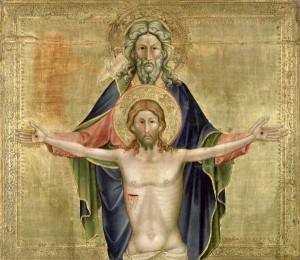 “My God, my God, why have you forsaken me?” is not a prayer of Jesus. Every prayer that Jesus ever prayed began with “Abba, Father!” Here Jesus is not saying that the Trinity was deconstructed and destroyed. The Trinitarian relationship between the Father, Son, and Holy Spirit remained intact on the cross!
“My God, my God, why have you forsaken me?” is not a prayer of Jesus. Every prayer that Jesus ever prayed began with “Abba, Father!” Here Jesus is not saying that the Trinity was deconstructed and destroyed. The Trinitarian relationship between the Father, Son, and Holy Spirit remained intact on the cross!
Jesus is quoting the old testament. 8 He is fulfilling prophecy. He quotes Psalms 22, the Messianic Psalm. This Psalm, more than any other, is a clear prophecy foretelling the death of Jesus, the Messiah.
#7 The Cross Wasn’t Pretty
The cross was a horrific and terrifying event. It wasn’t pretty. While it is important to see the celebratory reality of the cross (see #1), it is also important to remember how expensive the party cost God.
God paid a high price for our redemption. We celebrate joyously that sacrifice, but at the same time keeping in mind, with reverence, the enormous price that was paid. Jesus died a real death, feeling the full weigh of our sin and guilt. He suffered in our place, so that we might have life. Celebrate that, but just don’t forget the price.
#8 The Cross Reveals Love, Not Wrath
The cross reveals the love of God, it does not primarily reveal His wrath. When you think of the cross, do you see the wrath of God or His love? If wrath, you need to take another look. The cross is not about wrath, it is about love.
T.F. Torrance writes that, “The cross is a window opened into the very heart of God.” 9 We understand God through Jesus: in His life, and especially in His self-giving death. The cross reveals a God who is madly in love with the world, not a God who is furiously angry at it. “For God so loved the world…” 10
#9 The Life of Jesus > The Death of Jesus
 Paul writes that we are “saved by His life.” 11 The life of Jesus, and the work of Jesus should be inseparable. It’s not the cross that saves us, it’s Jesus. He embodies our salvation, and reconciliation back to God.
Paul writes that we are “saved by His life.” 11 The life of Jesus, and the work of Jesus should be inseparable. It’s not the cross that saves us, it’s Jesus. He embodies our salvation, and reconciliation back to God.
The cross matters, but the Christ of the cross matters even more. God did not use Jesus as a tool to fix humanity. Jesus Himself is the salvation of the human race. It is in His very person, in His hypostatic union: the joining of God and man in one body that we find salvation, reconciliation, and redemption. The new covenant is a person, not a transaction!
#10 The Cross is a Mystery
We know what the cross accomplished. We know that because of Christ we are forgiven, reconciled, redeemed, freed from sin, in union with Christ, and participants in the eternal life of God. How it all happens is a mystery.
While there are many theories as to how the cross accomplishes all these things, we cannot get to hung up on theories. It’s the person of Jesus that saves us, not our theology. We don’t have to understand the cross to benefit from it’s blessings. The bible doesn’t give us a clear formula for exactly what happened at calvary, but it does inspire us to worship God because of it.
Let’s keep the cross mysterious. We may not understand it fully, but that’s okay. No one is asking us to.
“Trust Jesus, then. After that, theologize all you want.” 12
He has done it! It is finished!
Like this article? Help me expand my reach by sharing:
Notes:
On the Incarnation , section 20. ↩Editor’s introduction to T.F. Torrance Atonement: The Person and Work of Christ, page lii. ↩The Grand Miracle, page 111 ↩See Ephesians 2:6 and Colossians 3. ↩I’ve written much about this view of atonement. You can find these articles here. ↩John 14:9 ↩See Atonement: The Person and Work of Christ, pages 38-39. ↩I’ve written more about this here. ↩The Mediation of Christ ↩John 3:16 ↩Romans 5:10 ↩Robert Farrar Capon, Kingdom, Grace, and Judgement. ↩April 15, 2014
Blood Moon Madness (End Times Info-Graphic)
Let me tell you an interesting fact:
End times prophetic words have a success rate of exactly 0% and a failure rate of exactly 100%.
If that’s confusing data for you, let me help you with this info-graphic. (I’ve spent hours of research to compile this data for you. You’re welcome.)
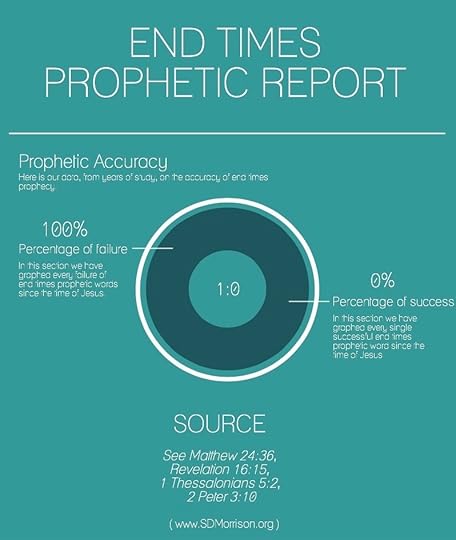
Blood Moons
What if blood moons are just something cool, not something apocalyptic?
Jesus said, time and time again throughout his parables, that we will never know when the end comes. I used to get super into end times predictions, constantly looking for the signs of Jesus’ return, and all that jazz.
So do these blood moons mean anything? No. 1
Let’s stop trying to divine something that is clearly a mystery. God forbids it. 2
Did you see the Blood Moon?
I’ve written a free eBook about the end times, download it here.
Like this article? Help me expand my reach by sharing:
Notes:
Greg Boyd does a great job in this video talking about why the blood moon prophecy is false. Check it out ↩It’s called divination. Here’s some great information about it. ↩April 13, 2014
Holy Week Meditation: The Love Dream of God
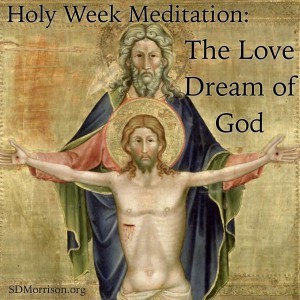 What drove Jesus to the cross?
What drove Jesus to the cross?
In the stunning words of St. Catherine:
You, high eternal Trinity, acted as if You were drunk with love, infatuated with Your creature.. 1
Love.
Jesus became a man, lived a life within our fallen existence, fought back against the Adamic nature, bearing the totality of our sin, death, and corruption on the cross in one seamless movement of a Trinitarian passion.
Jesus was driven by reckless abandonment, an unwavering commitment to the infinite love of God.
The eternal Godhead, the Triune Being, the Uncreated Light, became one with our fallen humanity, and in one movement of ecstatic love, defeated death.
The cross echoes the eternal love dream of the Father, Son, and Holy Spirit. This love-dream is that we may be One with God, that we may belong in His heart; that we may be included in the very life of God.
In essence, adoption. We were “predestined for adoption.” 2 Before the world was made, God had a dream: you, me, and the whole human race. Predestined to belong.
This passionate drive within the heart of our Triune God is the driving force behind the life of Jesus. Jesus died because the Father loves you. Jesus died because the Trinity has a dream for the human race, and nothing, not even death itself, will separate us from that dream.
Jesus died because we are loved, because we belong; because God is good.
What a stunning reality.
What a beautiful Gospel.
God became a man, dwelt among us, and died our death. The eternal dream of God is made fully manifest in the act of the Son. He loves us, and in that love, He cannot leave us to our corruption. He must, with reckless abandonment, save.
It’s a mockery of the cross to say that Jesus died because the Father needed blood on His hands to forgive us. It’s a shame that what is meant to be the most beautiful message the world has ever known, has been transformed into a highly pagan message that insults the very nature of God.
Jesus died because the Father hates the world, and needed to be appeased? Jesus died to satisfy some legal requirement within the heart of God?
Absolutely not.
Jesus died for love.
Jesus died because the Triune God has an unbreakable dream for the human race. This dream didn’t change when Adam fell. This dream burns on without diminishing for a second.
God’s mind is made up. It always has been.
His love is eternally set on the human race.
Jesus died because of an infinite love-dream of the Trinity to have us, to include us, and to adopt us into the Life of God.
His passionate pursuit is set on the human race. He is wildly in love with us, and it is because of this reckless love that He came, lived in our world, and died our death.
The cross…
This isn’t paganism. This is the Gospel.
Jesus didn’t die to appease an angry God. Jesus died to reveal a God of infinite love.
Jesus recklessly ran to the cross, for love.
Like this article? Help me expand my reach by sharing:
Notes:
Full quote ↩Ephesians 1:5 ↩April 11, 2014
Westboro Baptist, and the State of the American Church
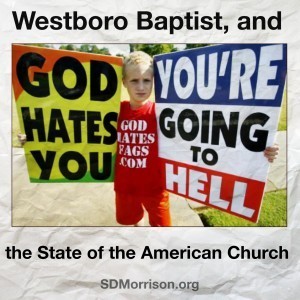 I was watching a documentary the other day, and at one point they interviewed the infamous Westboro Baptist Church. I’m putting it lightly to say that I was disgusted. How can someone misunderstand God so much?
I was watching a documentary the other day, and at one point they interviewed the infamous Westboro Baptist Church. I’m putting it lightly to say that I was disgusted. How can someone misunderstand God so much?
Westboro Baptist Church is infamously known for their hatred. Their message of a hatful god, and their blatant in-your-face methods of preaching this god are appalling. It would be a massive understatement to say that the Westboro Baptist Church is the most hated church in America.
In this documentary, the interviewer was asking some of the members of WBC what they thought about the love of God. To sum it up for you, the love of God, according to WBS, is 1) conditional 2) limited to only .001% of the population and 3) only secondary to the fiery hatred of God.
That’s love?
Now I’m not here just to rant about WBC. As much as I agree they’re a problem, I believe that there is a much larger theological issue at hand hiding behind the WBC.
The sobering reality is that Westboro Baptist is just the tip of the iceberg. Fundamentalism, while disagreeing with the extreme methods of WBC, ultimately agrees with their message: that God hates.
Let’s look at this:
WBC believes that God hates everyone. WBC believes that most of the human race will suffer in hell for all eternity. WBC believes in the love of God, but as conditional love (and only for the “elect” 1).
Now, here’s a direct quote from a well known American fundamentalist pastor, “God hates you! God is sick of you! God is frustrated with you! God is wearied by you!” 2
Wait, what? Is this supposed to be good news? 3
Some have tried to justify messages like this by saying that while God does hate people, He also loves them. Saying things like “God loves you, and hates you.” Which in my mind, creates an even bigger problem. Does God suffer from schizophrenia? Is God split up into multiple personalities?
But this, sadly, is exactly what’s taught in many American churches today. They have fallen in bed with western dualism, and have created a bi-polar God with multiple personalities. Essentially practicing mythology, not Christianity.
Fundamentalism has created a God who looks far more like Zeus, than Jesus.
There’s something seriously wrong.
The truth of the matter is this. While we may disagree with the methods of the Westboro Baptist Church, when you get down to it, much of American Christianity believes the very same things that WBC believes. i.e. God hates everyone, most people go to hell, and God’s love is only for the elect.
Fundamentalist theology in the Christian church is one of the most vile, twisted, and to be blunt: evil beliefs today. It is far worse than any other sect of Christianity, in my opinion, because Fundamentalists change the nature of God. They have created a hateful deity who, conveniently, hates all the same people they hate. Namely: homosexuals, liberals, democrats, and muslims.
Fundamentalism is the greatest enemy to the Gospel in America today. Fundamentalism spits in the face of the goodness of God, and of the love of God.
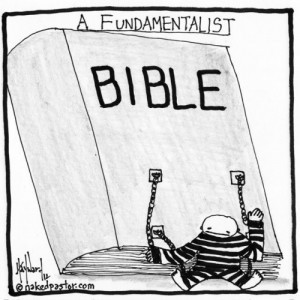
Via Naked Pastor
Westboro Baptist Church may be extreme in their actions, but, for the most part, Fundamentalist Christianity shares a similar theology. 4
So is Westboro Baptist Church a problem? Sure. But if we’re going to admit that, let’s get really honest about the state of the church. WBC is the tip of the iceberg. Fundamentalist Christianity has corrupted the face of God, and turned the God of infinite love into the God of infinite hatred. It’s sick, and terrifying.
The reaction of Fundamentalism to Homosexuality—for example, when they called for a boycott of World Vision because of their stance—is an insult to the message of Jesus.
Take a hard look at Christianity today, and I’m afraid you will find that the horrid beliefs of WBC are shared by a large portion of American Fundamentalist Christianity. 5
It breaks my heart to know that this message of hatred is rampant in the world today. It terrifies me to think about all the lives who have rejected God after falsely being taught the fundamentalist version of god. (One of hatred, judgement, and intolerance. A myth!) But this is all the more a reason for me to continue preaching the outrageous love of God, and His endless acceptance of the human race!
Stop preaching hatred. Stop preaching mythology. It’s blasphemy. It’s heresy. You’ve misunderstood our Father.
Preach the Gospel. Preach the kindness of Jesus. Preach His mercy, forgiveness, grace, and love.
God is good, He loves the world, He accepts the world, and He has gone and done all that needs to be done in Jesus Christ to forgive the world of sin. That’s Good News!
What do you think? Do you think Fundamentalism is a problem? How so? Leave me your thoughts below!
Like this article? Help me expand my reach by sharing:
Notes:
WBC is calvinist, for the record. Which leads to much of their theology. ↩Source. ↩I am convinced that God hates no one. If you’re curious, I’ve written elsewhere about the wrath of God here. ↩In comparison, check out their website and read the section under “Meaning of ‘God hates fags’”. You’ll find a very scriptural explanation that fits right in line with fundamentalist/calvinist teachings. ↩I should also say here that Fundamentalism started with good intentions. However, modern fundamentalism is a horrible sect of society driven by religious insanity and hatred. ↩April 3, 2014
I Will Not “Should” on Myself Today
 The Gospel invites us to join in the rest of God, to sit at the feet of our Father, and to savor the warmth of His love and embrace. The Good News of God’s outrageous love for us produces rest.
The Gospel invites us to join in the rest of God, to sit at the feet of our Father, and to savor the warmth of His love and embrace. The Good News of God’s outrageous love for us produces rest.
Are you living in rest?
This is a question I’ve been asking myself recently. Am I resting, or am I striving?
I’ve found that a good test for whether or not I’m living in rest, is to measure how much joy I have. If I feel joyful and content, there’s a good change I’m living in rest. If I feel worn out, tired, and frustrated, there’s a good chance I’m not living in rest.
Paul writes that we are “seated in heavenly places in Christ Jesus.” 1 That reality is the dominate reality of our existence as His beloved children. We are more in heaven, where our Father is, than we are on earth. 2
The product of resting in Christ is joy. So I often have to ask myself, “am I living in joy?” If not, I need to pause for a minute and figure out why.
Recently I’ve been coming to find that I am less and less living in rest. I’ve been busy over the last few months: I’ve published a book, started a business, and I’ve continually worked to improve this website. With all that I’ve been doing, if I’m honest, I sometimes find myself not living in rest. I am always thinking of what I should be doing. “I should write a blog today. I should improve the business today. I should…”
I’ve been should-ing on myself!
I’ve put pressure on myself to perform, instead just being. I’ve started realizing this over the last few weeks: I need to rest!
Maybe you’ve found yourself in a similar position. Maybe you feel stressed out, burnt out, of just plain tired. Just rest! 3 Productivity is important, but there’s a difference between being productive from rest, and being productive from performance.
The truth is that rest = more productivity not less. The difference between resting and striving is where you start from. Rest starts from contentment; unrest works for contentment. The later works to earn something, the former works from something.
We should be productive and active in our lives, but not outside the context of resting in Christ. The writer of Hebrews talks about entering into God’s rest, making clear just how important it is. Rest is so important that even God does it! 4
Are you resting? Are you living in the Joy of Christ?
It’s easy for me to slip into a performance mentality. To combat this, I’ve decided to change the way I talk to myself.
 I will not “should” on myself today.
I will not “should” on myself today. I will no longer judge my acceptance with God, or my contentment in life, on what I am or am not doing. Productivity doesn’t determine my worth, my Father does.
I will no longer beat myself up whenever I don’t do the things I think I should. I will be intentional with my rest. I will take joy seriously! 5
May we enter into the Rest of Christ, and live a life flooded with joy!
Will you join my in my journey of no longer “should-ing” on myself? Let me know in a comment below!
Like this article? Help me expand my reach by sharing:
Notes:
Ephesians 2:6 ↩Which is of course not to say that earth is in any way void of God. The two are inseparable. It’s a false Aristotelian idea that says heaven is “somewhere else” apart from the earth. ↩I know we all have responsibilities, rest doesn’t mean ignoring our lives, but rather, we should be able to manage our responsibilities while living in rest. ↩See Hebrews 4:10 ↩I always love the C.S. Lewis quote: “Joy is the serious business of heaven.” It absolutely is! ↩March 30, 2014
Go See Noah! Or Not. Whatever…
 “Heresy! Blasphemy! Why doesn’t Hollywood have perfect theology?!”
“Heresy! Blasphemy! Why doesn’t Hollywood have perfect theology?!”
I can’t help but laugh at all the outrage amongst many Christian camps towards the new Noah movie. Whether it’s blasphemy, an attack on the bible, or an insult to Christians—the new Noah movie has stirred up quite the controversy.
But honestly, why? Sure the movie isn’t biblically accurate. But do you actually think you could find me one that is? Seriously, even the Bible movies Christians love are inaccurate. By definition there’s a difference between a movie and a documentary. There’s always going to be some creative freedom in movies.
So why get so upset over this one?
Why not get upset about Evan Almighty, for example, another movie made based on the Noah story?
I think we hate Noah but love Evan Almighty because of the messages they’re preaching.
In Evan Almighty there’s a feel-good message of being kind to others. If you remember, it’s communicated through A.R.K.: “Acts of Random Kindness”.
What’s the message of the new Noah? Take care of the environment. 1
So what if we love Evan Almighty, and hate Noah not because of scriptural inaccuracy, but because of political division?
Evan Almighty is just as inaccurate (and on some level even more inaccurate) than the new Noah. If we’re honest with ourselves, I don’t think the issue is actually inaccuracy: it’s politics.
Christianity has been in bed with politics for far too long, and in my opinion it shouldn’t be.
Jesus didn’t say “go into all the world and argue politics.” We’re not called to be political, we’re called to be powerful men and women proclaiming the Good News.
The political agenda behind the new Noah movie left a bad taste in the mouth of Christians from the political right. Perhaps—and this is purely speculation—Christians are warning each other about this movie not because it’s inaccurate, but because it’s against their politics. 2
 So here’s my conclusion about all this: if you want to see Noah, go see Noah. If you don’t want to see Noah, don’t see Noah. It really doesn’t matter.
So here’s my conclusion about all this: if you want to see Noah, go see Noah. If you don’t want to see Noah, don’t see Noah. It really doesn’t matter.
Don’t demonize a movie because you disagree with it’s politics. Avatar was political, with a similar message as Noah, but I don’t see anyone getting upset about it.
When I see Noah, I’m going to judge it the same way I judge every movie: by simply asking, “did I enjoy it?” I suggest you do the same.
It may be inaccurate, but who cares? It’s a work of fiction. Enjoy it for what it is, don’t hate it for what it’s not. 3
Go see Noah! Or not. Whatever…
Have you seen Noah? What did you think? Why do you think Christians are so upset about this movie? Leave me you comments below!
Like this article? Help me expand my reach by sharing:
Notes:
An interesting article on this can be found HERE. ↩I don’t think anyone is consciously doing this by the way. I just think that we are using the inaccuracy of the movie as an excuse for the offense we take at it’s political statement. ↩It is not a documentary. Let’s stop criticizing it like it is. ↩March 26, 2014
Let’s Boycott World Vision?
 To be protestant is to protest. It is, I believe, the fatal flaw of protestantism. We fight. We argue. We separate, split, divide, and we make fools of ourselves in the process.
To be protestant is to protest. It is, I believe, the fatal flaw of protestantism. We fight. We argue. We separate, split, divide, and we make fools of ourselves in the process.
It’s one of the most tragic things I’ve run into since starting this blog. I’ve come to realize this tragically time and time again: Protestants divide. Friends who disagree with me, distant themselves.
You see, within protestantism, to agree is to connect. Which also means that disagreement means disconnection. In other words, within protestantism, if you disagree with me I separate myself from you. If you disagree with me, I can’t be your friend.
It’s tragic, and honestly it breaks my heart. Just the other day I had a friend remove all contact from me, insult me personally, calling me a heretical blasphemer, and block me out of their life for good.
Is this what Jesus had in mind when He imagined church?
There’s something wrong with any system of belief that divides people. This is what I believe is the tragedy of protestant theology: we divide when we disagree.
The proof is in history. Just look at how many times the protestant world has split, sometimes over the most ridiculous things. There are right now over 33,000 protestant denominations. 33,000! That’s insane!
It’s clear to see that there’s something wrong here. Protestantism may be good on some level, but at what cost? So far: division, and disunity.
Here’s a recent example that I absolutely find ridiculous. World Vision, a Christian organization helping thousands of impoverished children world wide, is right now being boycotted by other Christians. Why? Because these Christians disagree with World Vision’s stance on Homosexuality.
I find it absolutely repulsing.
Because of our disagreements we boycott an organization that helps children eat. You know what will happen as a result? Children will go hungry, and some of them may even die.
This is what protestantism does. It takes ideas, and it places them above people. Saying, in essence, “I value my ideology more than I value you.”
The dividing spirit of protestantism has done far more harm than good in our world. What’s the way forward?
I propose a simple solution: friendship.
Let’s be friends with one another! It should go without saying, but in my experience it seems to be the last thing on anyones mind. Can’t we just be friends? Even if you disagree with me?
Can we not love, support, and encourage one another even if we disagree about something?
Disagreement shouldn’t mean division.Disagreement isn’t an excuse to exclude, boycott, or rebel against anyone.
I’ve personally found disagreement to be a great point of conversation. I honestly value disagreement. I value when someone disagrees with me because at least it means they’re thinking. There’s something powerful about challenging ideas, and expressing yourself honestly. I appreciate anyone who lives in the freedom of that. Disagreement should actually lead to greater levels of friendship!
I don’t care if you disagree with me, I still want to be your friend. I will still support you, love you, and respect you. I think this is an attitude the Christian world needs to develop.
Like this article? Help me expand my reach by sharing:
March 23, 2014
Is the Rapture Real?
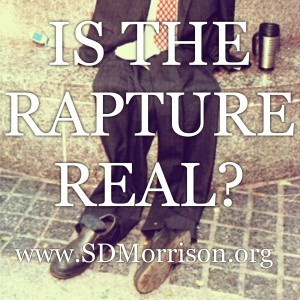 What if I told you that the rapture is something entirely made up? Would you breath a deep sight of relief, or would you be offended?
What if I told you that the rapture is something entirely made up? Would you breath a deep sight of relief, or would you be offended?
The Rapture theory is commonly held in much of Christianity today, but why? Is it really so biblical?
I don’t believe it is. In my mind, the rapture is a myth. It is complete fiction made up in the 19th century through the distortion of scripture.
So whether you believe in the rapture or not, allow me to present for you five compelling reasons why I believe the rapture isn’t real.
#1 It’s Unbiblical
The Rapture, despite how much it’s accepted as fact, is completely unbiblical. There is literally no direct scriptural evidence for the rapture. All of the scriptures classically used to defend the rapture are either a) taken out of context or b) vague and obscure.
If the rapture really is true, then why isn’t the bible filled with it? Why do rapture teachers have to use such vague passages to back up their beliefs?
Sure, there are a few verses that kind of hint towards the rapture. But as soon as you take the time to understand the proper context, you’ll discover that you’ve been implying your own meaning into the text (when it should always be the other way around).
#2 Implies a Third Coming of Christ
Rapture teachers, in order to back up their position, have invented a third coming of Christ. 1 They will teach that Jesus’ second coming is the rapture (where he sucks up all the Christians into the sky), and His final coming is a third coming (one of final judgement).
This is logically inconsistent, and scripturally insulting. There is no such thing as a third coming of Christ. When He comes again, it will be the final and full manifestation of the Kingdom. 2
 Rapture teachers make the false distinction between “the day of Christ” and “the day of the Lord”, claiming that the bible refers to the rapture and the second coming of Christ as different events by these terms. But this logic is seriously flawed. 3
Rapture teachers make the false distinction between “the day of Christ” and “the day of the Lord”, claiming that the bible refers to the rapture and the second coming of Christ as different events by these terms. But this logic is seriously flawed. 3
#3 Thessalonians 4:17 in Context
Thessalonians 4:17 is perhaps the most important bible verse in a rapture teachers theology. But is this verse really talking about the rapture? Let’s look at the context.
In Thessalonians 4:17 Paul writes “Then we who are alive and remain shall be caught up together with them in the clouds to meet the Lord in the air…”
You can see why this can seem like a rapture verse. So here more than ever it’s important to understand what is leading up to this verse, and where it fits into the whole of this letter. 4
Right before verse seventeen Paul is talking about resurrection from the dead. This is massive. Paul is not talking about the end times. Paul is encouraging the church with the hope of resurrection. i.e. Death is not permanent! Death is not the end!
Check out specifically verse 14: “For if we believe that Jesus died and rose again, even so God will bring with Him those who sleep in Jesus.” Paul here makes the parallel between Christ’s resurrection and our resurrection. Death is defeated by Christ, and we share in His victory! Far from being a verse for the rapture, this verse is about the resurrection.
#4 A 19th Century Invention
The rapture was first invented by John Nelson Darby in the 19th century. 5 Up until that time absolutely no one believed in the rapture.
Think about that for a moment.
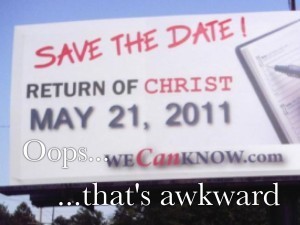 Some may be quick to say “Stephen, why are you questioning the rapture? It’s such a well established doctrine!” But who’s really the one questioning orthodoxy here? If you believe in the rapture than essentially you are saying that for 1,800 years the church as a whole has been wrong.
Some may be quick to say “Stephen, why are you questioning the rapture? It’s such a well established doctrine!” But who’s really the one questioning orthodoxy here? If you believe in the rapture than essentially you are saying that for 1,800 years the church as a whole has been wrong.
Are you that confident in this? Are you a better theologian than the reformers, the early church, or even the Apostle Paul?
Because none of them ever taught the rapture.
#5 Fear Based
The Rapture is an entirely fear based doctrine. It sounds much more like mythology, than Christianity.
The rapture creates a “rescue me” mentality. The church has become far more interested in being rescued from an “evil world” than it is in changing the world with the Gospel.
Aren’t we called to be good stewards of the earth? 6 Aren’t we looking forward to a “new heaven and a new earth”? 7 (Not, mind you, a destroyed earth.)
The rapture has detrimentally corrupted the church with an escapist mindset. We don’t feel responsible to build a lasting legacy. Instead, we look forward to our escape from this world. Ultimately, the rapture undermines the command of Jesus to preach the Gospel to all creation.
So is the rapture real? I doubt it.
Either way, who cares? We teach the rapture in Christianity sometimes like it matters. Let me tell you, it doesn’t. While the bible may be unclear about the end times, it is clear about this: we will never fully know what’s going to happen, when it’s going to happen, or even how it’s going to happen.
Just trust Jesus, enjoy abundant life, and preach the Gospel!
So what do you think? Is the rapture real? Leave me a comment below!
If you enjoyed this article, you may also enjoy the free eBook I’ve written on the end times. You can get it by clicking here.
Like this article? Help me expand my reach by sharing:
Notes:
No one would ever admit this, but if you listen to what the rapture teaches, it is implied. ↩It’s important to note here that the kingdom has already come fully in Christ. However, the second coming is properly understood as a full manifestation. It’s not that Jesus is gone from the earth, soon to magically come back. Christ is here and His kingdom is with Him right now. ↩By the same way of thinking you could conclude that when Mathew’s gospel writes the “kingdom of heaven” and Luke’s/Mark’s gospel the “Kingdom of God” that this means there are two kingdoms. ↩Remember, the new testament is a compilation of letters. Theses letters where never meant to be picked apart like we treat them today. They must be taken as a whole to be understood properly. ↩Specifically, the 1830′s ↩Psalms 115:16 ↩Revelation 21:2 ↩March 19, 2014
“Prone to Sin” – Disgrace to Grace #4
 Disgrace To Grace is a series of articles written to debunk doctrines that I believe have hijacked the Good News of God’s outrageous grace. Here’s #4, enjoy!
Disgrace To Grace is a series of articles written to debunk doctrines that I believe have hijacked the Good News of God’s outrageous grace. Here’s #4, enjoy!
Prone to Sin
I grew up believing that at the core of my existence, I was prone to sin. Therefore, I believed I would spend my entire life “dying daily” and fighting against my own evil desires. In Heaven—sure, I could be finally free from sin. But here on earth? No way. I was destined to fight against sin for my entire life.
My life radically changed when God helped me to see the truth—that I am not prone to sin.
God helped me see that through His Son I was not a sinner, but a saint; not evil, but good; not corrupt, but righteous.
This radically changed everything I thought I knew about Christianity. Actually, this revelation has been arguably the most life-changing revelation I have learned over the last five years. It changed my theology, my mindset, and my relationship with God.
The mindset that says “you will always struggle with sin” is a major disgrace to grace. Jesus died to set us free from sin, not just to get us into Heaven. So here are three powerful thoughts, along these lines, to help you see that you too are free from sin.
Free From Sin
Thought #1 – I am not what I do.
What you do does not define who you are. We like to label one another with titles based on actions, but scripturally it’s important to see that God does not operate like this.
God declares “those things that are not, as though they are.” 1 God’s declarations are creative in function, meaning they create the reality they declare. 2
Therefore, when the scriptures say we are righteous 3, holy 4, and new 5—God is not declaring a possibility, He is declaring the reality.
What God says you are, you are. You are defined by God, not by you. Your actions may look different than righteous, holy, and new but that does not change who you are. God defines you, period.
Thought #2 I am (already) dead.
We get the Pauline phrase “I die daily” horribly wrong in Christianity. What did Paul really mean when He wrote this?
Paul writes in 1 Corinthians 15:31 that he “dies daily.” But don’t forget the context! Listen to what he writes just one verse prior. “Why are we also in danger every hour?” 6
Paul is not talking about spiritually beating himself up! He is literally saying that he is at risk of death every day for the sake of the Gospel! Elsewhere he boasts about how much he has suffered for the sake of the gospel 7.
We are not called to die daily. We are called to see that we have already died with Christ!
Thought #3 I am inherently good.
Our old sinful self is dead and gone. We do not have to fight an internal sin nature, because none exists. We are entirely free from the bondage of sin!
We are now inherently good!
We are good not because we have earned our own way into this goodness. We are good only because the work of Christ has made us good. No longer sinners prone to sin, we are saints prone to goodness!
Paul writes in Galatians 2:20 that “I have been co-crucified with Christ. It is no longer I who live, but Christ who lives in me. The life I now live, I live by the faith of the Son of God.”
Our old nature is dead with Christ—lost and gone forever. We are now sharing in the life of Christ Himself. Our nature is His nature! 9
The Successful Cross
The cross was a success. Jesus destroyed the sin nature, and removed it from us entirely. We are free from sin, no longer prone to sin. We are prone to righteousness, goodness, and holiness!
Stop trying to work your way into righteousness, and just trust in the righteousness of Christ. Trust in the success of the cross, and the finished work of Christ!
What do you think? Do you believe you are “prone to sin” or “prone to righteousness”? Leave me a comment below!
Like this article? Help me expand my reach by sharing:
Notes:
Romans 4:17 ↩Genesis 1:3—God spoke, and it was. ↩Romans 3:22 ↩1Peter 2:9 ↩2 Corinthians 5:17 ↩vs. 30 NASB ↩2 Corinthians 11:16-33 ↩The Scriptural evidence for our death, in the past tense, is overwhelming. To name a few verses see: Galatians 2:20, Romans 6 (11 times Paul mentions your death here!), 2 Corinthians 5:14, and Colossians 3. ↩Partakers of the divine nature, 2 Peter 1:4 ↩


